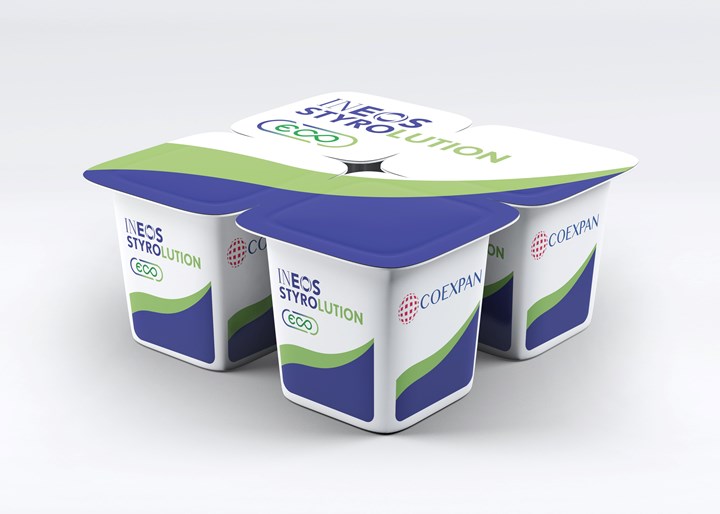Ineos Styrolution and Coexpan Claim Food Contact Standards for 100% Mechanically Recycled Polystyrene
The food contact standards apply across all dairy product formats using the recycled PS.

Innotech (Grupo Lantero’s R&D center for packaging solutions) has announced the successful completion of trials with the full range of yogurt cup formats. The trials addressed formats used in both European and American markets using Ineos Styrolution PS ECO 440FC MR100 material, a 100% post-consumer recycled polystyrene grade produced from household food packaging waste. All dairy formats have been produced and tested to food contacts standards.
The Innotech trials show that mechanically recycled PS is produced and successfully tested to food grade standards across all shapes and sizes of dairy applications. According to the findings PS is not only the best material for dairy applications, but also offers the shortest path to circularity for existing market applications. Members of the entire value chain, and in particular retailers and brand owners, are encouraged and invited to participate and understand what this could mean for PS and for their respective businesses.
Gonzalo Sanchez, head of recycling within Coexpan, comments: “It is a massive achievement to be able to confirm the success of this exercise, and the results speak for themselves. Many brand owners want the polystyrene journey to continue, and we now have the proof that mechanically recycled polystyrene offers a solution for their food contact applications. This will allow customers to concentrate on their core business rather than looking for alternative materials requiring changes to existing processes and investments into new equipment.”
Coexpan is the Grupo Lantero division that specializes in the manufacture of rigid plastic sheets and thermoformed products, The company has 13 production plants in eight countries in Europe and the Americas (Spain, France, Germany, Italy, Russia, Chile, Brazil and Mexico), specialized in rigid sheet solutions and thermoformed packaging in PS, PP, PET, and PLA.
Related Content
-
The Effects of Time on Polymers
Last month we briefly discussed the influence of temperature on the mechanical properties of polymers and reviewed some of the structural considerations that govern these effects.
-
Polymer Science for Those Who Work With Plastic — Part 1: The Repeat Unit
What are the basic building blocks of plastics and how do they affect the processing of that material and its potential applications in the real world? Meet the repeat unit.
-
Prices of All Five Commodity Plastics On the Way Up
Despite earlier anticipated rollover in prices for most of the volume commodity resins, prices were generally on the way up for all going into the third month of first quarter.













